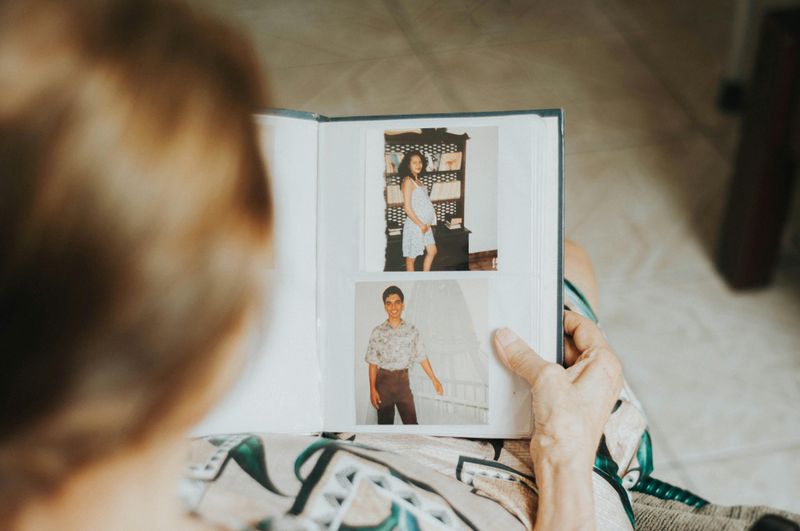Moving on from hurt, loss, or disappointment isn’t about forgetting or pretending nothing happened. It’s about choosing to grow beyond the pain while holding onto your dignity and peace. People who move on gracefully understand that healing requires conscious choices—not just about what they do, but also what they refuse to do.
1. They Refuse to Cling to False Hope

Waiting for someone to change when every action proves they won’t is like standing in the rain expecting sunshine. People who move forward gracefully recognize when hope has become a trap instead of a comfort. They understand that accepting reality, no matter how painful, is the first step toward genuine freedom.
False hope keeps you frozen in place, constantly checking your phone or replaying conversations, searching for signs that aren’t there. When you stop clinging to what could be and face what actually is, you reclaim your power. Reality may hurt at first, but it’s the foundation for real healing.
Acceptance doesn’t mean you didn’t care or that the situation wasn’t important. It simply means you’re choosing truth over fantasy.
2. They Refuse to Replay the Past Endlessly

Memories have their place, but living inside them robs you of today. Those who heal gracefully know the difference between honoring what was and being imprisoned by it. They acknowledge their history without letting it write their future.
The “what if” game is exhausting and endless. What if you’d said something different? What if you’d stayed or left sooner? These questions spiral forever without answers. Graceful people recognize when nostalgia shifts from sweet to destructive, and they gently redirect their thoughts forward.
Your past shaped you, but it doesn’t own you. Learning to appreciate memories without drowning in them is a skill that brings peace. The present moment deserves your full attention and energy.
3. They Refuse to Seek Validation or Closure From Others

Waiting for an apology that may never come is like holding your breath underwater—eventually, you have to surface or drown. Graceful people understand that closure is something you give yourself, not something others owe you. They stop waiting for permission to move on.
Your worth isn’t determined by whether someone acknowledges their mistakes or validates your feelings. When you need someone else to say the right words before you can heal, you’ve handed them control over your happiness. Taking that power back is liberating.
Self-validation means trusting your own experience and feelings without external confirmation. You know what happened. You know how it affected you. That’s enough to begin healing and moving forward with confidence.
4. They Refuse to Ignore Their Own Hurts

Pretending everything is fine when your heart is breaking doesn’t make you strong—it makes you stuck. People who move on gracefully give themselves permission to feel the full weight of their pain. They understand that emotions need acknowledgment, not suppression.
Pushing feelings down doesn’t make them disappear; it just makes them show up later in unexpected and unhealthy ways. Anger, sadness, disappointment—these emotions deserve space. Processing them honestly is how you eventually release them.
Healing isn’t linear, and some days will be harder than others. That’s completely normal. Allowing yourself to hurt when you need to is an act of self-compassion, not weakness. True strength includes vulnerability.
5. They Refuse to Sacrifice Their Boundaries

Boundaries aren’t walls built from anger; they’re guidelines built from self-respect. When you move on gracefully, you stop tolerating behavior that diminishes your peace or dignity. Disrespect, manipulation, and emotional games no longer have a place in your life.
Many people worry that setting boundaries makes them difficult or unkind. Actually, boundaries protect both parties by creating clear expectations. They communicate what you will and won’t accept without apology or explanation.
Violating your own boundaries to keep others comfortable is self-betrayal. People who heal well understand that saying no is sometimes the most loving thing you can do—for yourself and for others. Your limits matter.
6. They Refuse to Put Others’ Needs Above Their Own Indefinitely

Constantly prioritizing everyone else’s needs while ignoring your own isn’t noble—it’s exhausting. Graceful people recognize when giving has turned into self-abandonment. They understand that caring for others shouldn’t mean erasing themselves.
Self-care isn’t selfish; it’s necessary. You can’t pour from an empty cup, and running yourself dry helps no one in the long run. Learning to say no without guilt is a milestone in healing. Your needs matter just as much as anyone else’s.
This doesn’t mean becoming cold or uncaring. It means finding balance where your well-being is also a priority. When you stop draining yourself for others, you actually become more present and effective in your relationships.
7. They Refuse to Rush Their Healing

Healing doesn’t follow a schedule, and anyone who tells you to “get over it” by a certain date doesn’t understand how growth works. People who move on gracefully honor their own timeline without comparing it to others or feeling pressured by arbitrary deadlines.
Some wounds take longer to heal than others, and that’s okay. Rushing the process often means skipping important steps, which can lead to incomplete healing. You’re not weak for needing time; you’re wise for taking it.
Society often pushes us to bounce back quickly, but real transformation can’t be hurried. Moving at your own pace shows self-awareness and maturity. Trust yourself to know when you’re ready for the next step.
8. They Refuse to Close Their Hearts Altogether

Getting hurt can tempt you to build walls so high that nothing and no one can reach you. But people who heal gracefully know the difference between protection and isolation. They guard their hearts wisely without shutting down completely.
Cynicism might feel safer, but it’s really just another form of being stuck. Refusing to love, trust, or connect again means the pain still controls you. True healing allows you to remain open while being more discerning about who gets close.
Vulnerability after heartbreak takes courage, but it’s also what makes life rich and meaningful. Staying open doesn’t mean being reckless—it means refusing to let past pain steal your future joy and connection.
9. They Refuse to Define Themselves by Their Past or Their Pain

Your story includes chapters of pain, but those chapters don’t define the entire book. People who move on gracefully refuse to let their wounds become their identity. They understand that what happened to them is part of their journey, not the destination.
It’s easy to get stuck in the role of victim or survivor, wearing past trauma like a badge. While acknowledging pain is important, letting it define you limits your growth. You are more than what hurt you.
Rewriting your narrative means choosing who you want to become rather than staying frozen as who you were. Your past shaped you, but your future is still unwritten. Moving forward gracefully means embracing your full, evolving self.

Comments
Loading…